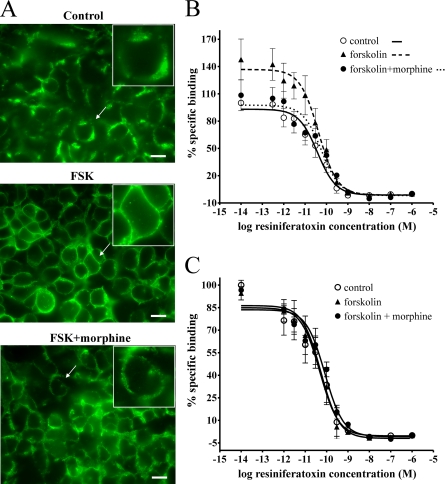FIGURE 6.
Plasma membrane TRPV1 localization is increased by treatment with forskolin and reversed by morphine. A, treatment with forskolin caused translocation of TRPV1 immunoreactivity to the plasma membrane. TRPV1/MOP HEK cells were treated with 0.1% DMSO (Control), forskolin (500 μm, FSK), or forskolin and morphine (1 μm, FSK+morphine) and stained for TRPV1 expression (green). Treatment with forskolin caused a marked shift in TRPV1 localization to plasma membrane-dominant expression (FSK). Pretreatment with morphine reversed TRPV1 staining to mixed plasma membrane and cytosolic pattern (FSK+morphine). Scale bar, 20 μm. Data are representative of three independent experiments. A, inset, magnified view (×1.6) of cells indicated by an arrow. B, plasma membrane TRPV1 binding density is increased by treatment with forskolin. Quantification of plasma membrane TRPV1 protein was assessed by [3H]RTX binding to purified plasma membrane samples. TRPV1/MOP HEK cells were treated with 0.1% DMSO (control, ○) or forskolin (500 μm, ▴) containing in addition morphine (1 μm) as required (FSK+morphine, •), and [3H]resiniferatoxin displacement from purified plasma membrane preparations was assessed in the presence of various concentrations of unlabeled resiniferatoxin. Treatment with forskolin increased TRPV1 binding density in plasma membrane fractions compared with control, and this increase was reversed by pretreatment with morphine. Data are presented as mean ± S.E. from five independent experiments. C, total cell TRPV1 binding density is not affected by treatment with forskolin. [3H]Resiniferatoxin displacement from total cell protein preparations was assessed in TRPV1/MOP HEK cells treated with 0.1% DMSO (control, ○) or forskolin (500 μm, ▴) containing in addition morphine (1 μm) as required (FSK+morphine, •). Treatment with forskolin did not affect total cell TRPV1 binding density. Data are presented as mean ± S.E. from five independent experiments.

